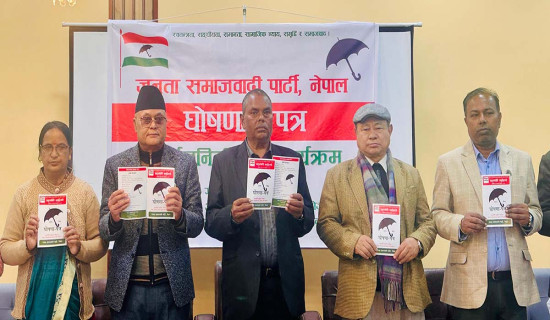- Friday, 13 February 2026
Police to use AI for crime analysis: CID
Kathmandu, Feb. 18: Financial and digital crimes have been increasing at a rapid pace every year in Nepal. However, with a shortage of specialised manpower and technologies, Nepal Police has struggled to tackle such crimes.
According to the data provided by the Crime Investigation Department (CID) of Nepal Police, financial crimes increased from 5,383 in 2021/22 to 12,135 in 2022/23 and 13,263 in 2023/24. Similarly, digital crimes rose to 255 in 2023/24 from 133 in 2022/23.
“The trend of crimes has been changing over time. Lately, digital equipment has been involved in majority of crimes. So, we have decided to use Artificial Intelligence (AI) to analyse crimes and predict their future trends/rates,” said Additional Inspector General of Police (AIGP) Kuber Kadayat, head of the CID.
“Nepal Police will be using ‘AI Based Business Tool’,” AIGP Kadayat informed in an interaction programme with journalists at the CID Headquarters in Naxal on Monday.
The AI tool has already been procured after a tender process. The tool is said to be prepared by Smartend, an AI company, and will be operated with the specialised team of the Information Technology Directorate (ITD).
“The company trained 15 of our officers regarding the use of software. Firstly, seven officers and then eight officers, in two phases,” said Deputy Inspector General of Police (DIGP) Arun Bhandari, chief at the ITD.
DIGP Bhandari informed that the hardware for the AI tool has been installed while the software-related process is underway. “We will start using the tool at the earliest,” he added.
The analytic tool is said to analyse the trend of crimes, its causes and impacts alongside a prediction of the crimes in future. “It will help us analyse data effectively and efficiently. We can also generate feedback and recommendations for promotion based on the input,” said DIGP Bhandari.
Likewise, Nepal Police stressed the need for a change in its organisational structure, process, and selection. “We need at least one IT officer in each police office in the present crime-prone scenario. We also need specialised officers in specific areas, such as individuals with a legal background in the legal process of crimes and science-background students in IT and forensics,” said AIGP Kadayat.
“Such changes in Nepal Police organisation structure will take time, but the debate has started and is expanding. We expect several positive changes in our agency soon,” AIGP Kadayat added.
The CID also informed that they planned to procure DNA-testing-related advanced equipment and expand the service to different parts of the country.
“We also plan to add technologies of digital forensic and expand the services outside Kathmandu. The centralised service has hampered the investigation and the manpower in the centre is insufficient to oversee the whole country,” said AIGP Kadayat.
As a part of tackling crime-related activities, Nepal Police has also expanded the audi0-video recording system with a sound proof double mirror cabin in 60 district police offices.
“The Finance Ministry has been positive in investing in the digital sector of Nepal Police, so we are utilising the support,” AIGP Kadyat said.





-square-thumb.jpg)










